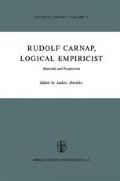Abstract
Many philosophers dislike possible individuals. Professor W. V. Quine is a well-known case in point. According to him, possible individuals create an ontological slum, “a breeding ground for disorderly elements”. At one point, he elaborated his apprehensions as follows: “Take, for instance, the possible fat man in that doorway; and, again, the possible bald man in that doorway. Are they the same possible man, or two possible men? How do we decide? How many possible men are there in that doorway? Are there more possible thin ones than fat ones? How many of them are alike? Or would their being alike make them one? … Or … is the concept of identity simply inapplicable to unactualized possibles? But what sense can be found in talking of entities which cannot meaningfully be said to be identical with themselves and distinct from another? These elements are well-nigh incorrigible.” 1
Access this chapter
Tax calculation will be finalised at checkout
Purchases are for personal use only
Preview
Unable to display preview. Download preview PDF.
References
W. V. Quine, From a Logical Point of View, Harvard University Press, Cambridge, Mass., 1953 (2nd ed., revised, 1961), p. 4.
W. V. Quine, Word and Object, M.I.T. Press, Cambridge, Mass., 1960. For further elucidation of the precise nature of the indeterminacy of ontology and of radical translation, see also Quine’s reply to Chomsky in Words and Objections: Essays on the Work of W. V. Quine, Donald Davidson and Jaakko Hintikka (eds.), D. Reidel Publishing Company, Dordrecht, 1969.
Dana Scott, ‘Advice on Modal Logic’, in Philosophical Problems in Logic: Some Recent Developments, Karel Lambert (ed.), D. Reidel Publishing Company, Dordrecht, 1970. Richard Montague’s highly important work in this area also uses the idea of ‘prefabricated’ domain of individuals which just show up in the different possible worlds one is considering; see e. g. Richard Montague, ‘Pragmatics’ in Contemporary Philosophy — La philosophic contemporaine Vol. 1 (ed. by R. Klibansky), La Nuova Italia Editrice, Florence, 1968, pp. 102-122 and Richard Montague, ‘On the Nature of Some Philosophical Entities’, The Monist 53 (1969) 159–194.
The first big wave of work in this area was largely due to Stig Kanger and Saul Kripke; see Stig Kanger, Provability in Logic (Stockholm Studies in Philosophy, Vol. 1), Stockholm, 1957;
Stig Kanger, ‘The Morning Star Paradox’, Theoria 23 (1957) 1–11;
Stig Kanger, ‘A Note on Quantification and Modalities’, ibid. 133–134;
Stig Kanger, ‘On the Characterization of Modalities’, ibid. 152–155;
Saul Kripke, ‘A Completeness Theorem in Modal Logic’, The Journal of Symbolic Logic 24 (1959) 1–14;
Saul Kripke, ‘Semantical Considerations on Modal Logic’ (Proceedings of a Colloquium on Modal and Many-Valued Logics, Helsinki, 23–26 August, 1962), Acta Philosophica Fennica 16 (1963) 83–94;
Saul Kripke, ‘Semantical Analysis of Modal Logic: I. Normal Modal Propositional Calculi’, Zeitschrift für mathematische Logik und Grundlagen der Mathematik 9 (1963) 67–96;
Saul Kripke, ‘Semantical Analysis of Modal Logic: II, Non- Normal Modal Propositional Calculi’ in The Theory of Models (Proceedings of the 1963 International Symposium at Berkeley), J. W. Addison, L. Henkin, and A. Tarski (eds. ), Amsterdam 1965, pp. 206–220;
Saul Kripke, ‘The Undecidability of Monadic Modal Quantification Theory’, Zeitschrift für mathematische Logik und Grundlagen der Mathematik 8 (1962) 113–116. See also Montague’s work, partly mentioned above and partly referred to in these writings of his, and the work of E. J. Lemmon and Dagfinn Føllesdal. Most of my own early work here is collected in Models for Modalities: Selected Essays, D. Reidel Publishing Company, Dordrecht, 1969.
Cf. e. g. L. J. Savage, The Foundations of Statistics, John Wiley, New York, 1954
Cf. Jaakko Hintikka, ‘“Knowing that One Knows” Reviewed’, Synthese 21 (1970) 141–162.)
See also W. V. Quine, The Ways of Paradox and Other Essays, Random House, New York, 1966, Ch. 14
Ruth Barcan Marcus, ‘Interpreting Quantification’, Inquiry 5 (1962) 252–259,
Author information
Authors and Affiliations
Editor information
Editors and Affiliations
Rights and permissions
Copyright information
© 1975 Springer Science+Business Media Dordrecht
About this chapter
Cite this chapter
Hintikka, J. (1975). How Carnap Built the World in 1928. In: Hintikka, J. (eds) Rudolf Carnap, Logical Empiricist. Synthese Library, vol 73. Springer, Dordrecht. https://doi.org/10.1007/978-94-010-1807-4_2
Download citation
DOI: https://doi.org/10.1007/978-94-010-1807-4_2
Publisher Name: Springer, Dordrecht
Print ISBN: 978-94-010-1809-8
Online ISBN: 978-94-010-1807-4
eBook Packages: Springer Book Archive

